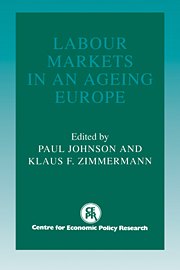Book contents
- Frontmatter
- Contents
- List of figures
- List of tables
- Preface
- List of conference participants
- 1 Ageing and the European labour market: public policy issues
- 2 Ageing and European economic demography
- 3 Ageing and employment trends: a comparative analysis for OECD countries
- 4 Ageing and the labour market in Poland and Eastern Europe
- 5 The implications of cohort size for human capital investment
- 6 Does an ageing labour force call for large adjustments in training or wage policies?
- 7 On ageing and earnings
- 8 Age, wages and education in The Netherlands
- 9 Ageing and unemployment
- 10 Ageing, migration and labour mobility
- Index
9 - Ageing and unemployment
Published online by Cambridge University Press: 05 November 2011
- Frontmatter
- Contents
- List of figures
- List of tables
- Preface
- List of conference participants
- 1 Ageing and the European labour market: public policy issues
- 2 Ageing and European economic demography
- 3 Ageing and employment trends: a comparative analysis for OECD countries
- 4 Ageing and the labour market in Poland and Eastern Europe
- 5 The implications of cohort size for human capital investment
- 6 Does an ageing labour force call for large adjustments in training or wage policies?
- 7 On ageing and earnings
- 8 Age, wages and education in The Netherlands
- 9 Ageing and unemployment
- 10 Ageing, migration and labour mobility
- Index
Summary
Introduction
Ironically, just as the economic problems created by population ageing have been identified as a matter of most imminent concern for the majority of advanced economies, anxiety has arisen about the flood of immigration these countries are expecting in the near future. While it appears at first glance that these problems might be offsetting, a closer look reveals that neither the economic effects of population ageing nor the economic effects of immigration are well understood. Will larger cohorts experience dismal labour market outcomes as they move through their life cycle? Will workers in the same age bracket as incoming migrants suffer from migrant inflow?
Previous research has found cohort size to have an important impact on the relative labour market outcomes of the very young. For the US economy, there is strong evidence that the large ‘baby boom’ cohorts experienced relatively low earnings and high unemployment upon labour market entry. It appears that workers of different ages are not perfectly substitutable in production and thus a large cohort is likely to face depressed labour market conditions. Since workers can influence their prospects via their human capital investments, the persistence of adverse cohort effects over the life cycle is a matter of empirical and theoretical controversy.
Labour market imperfections might create an additional potential for the persistence of adverse cohort size effects over the life cycle.
- Type
- Chapter
- Information
- Labour Markets in an Ageing Europe , pp. 216 - 254Publisher: Cambridge University PressPrint publication year: 1993
- 8
- Cited by

